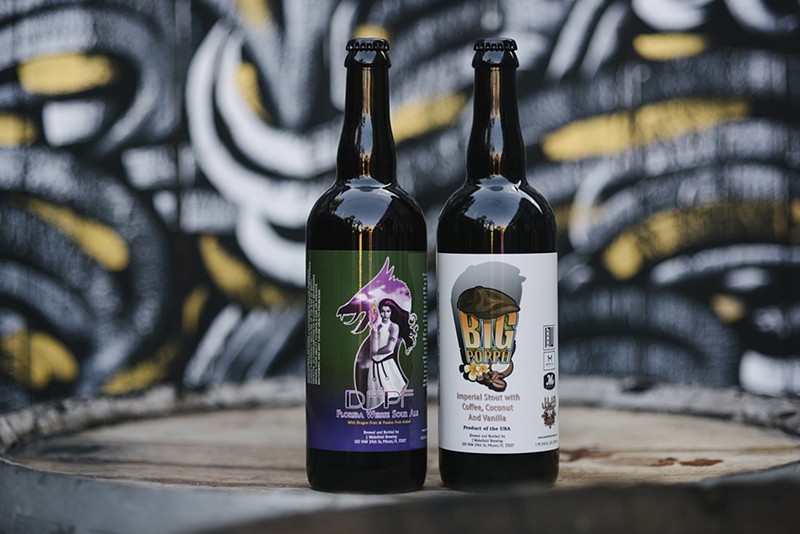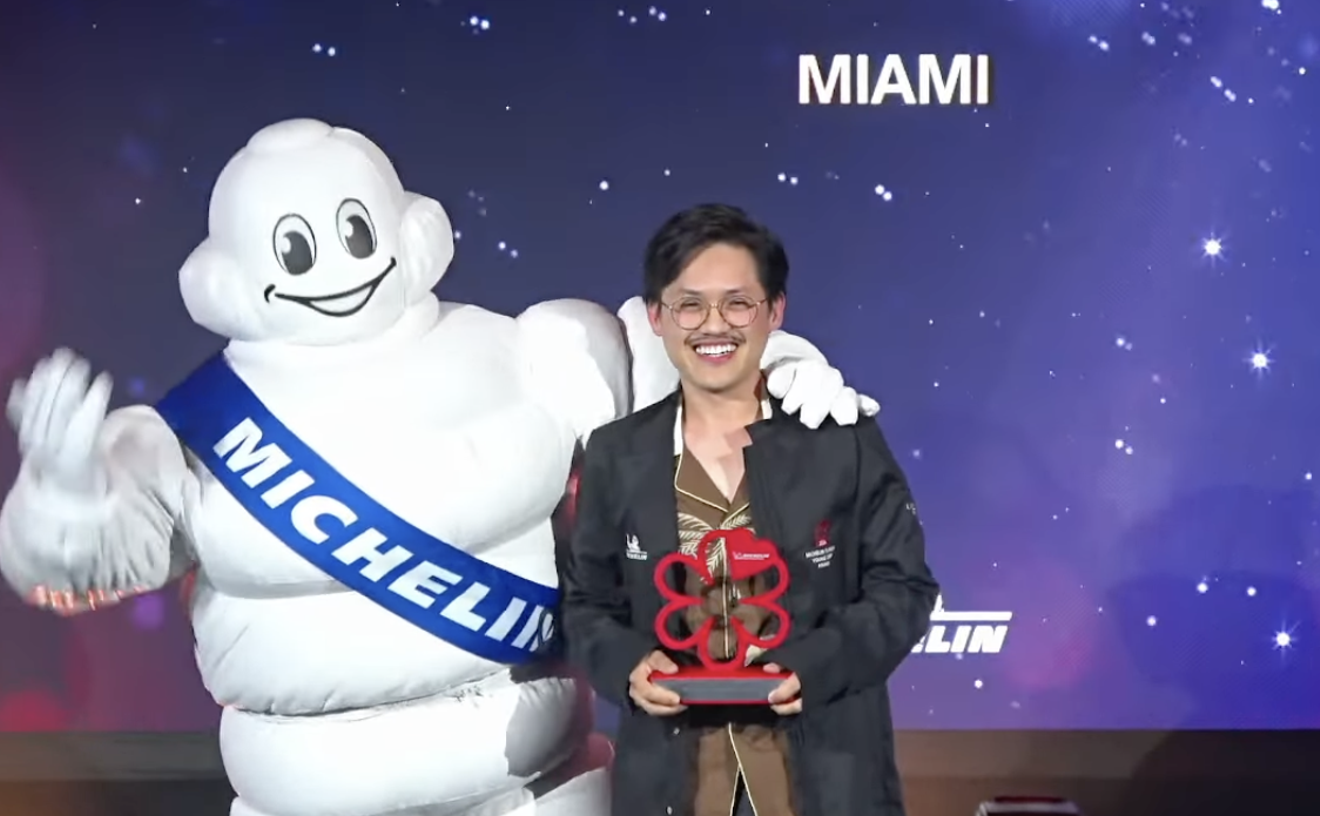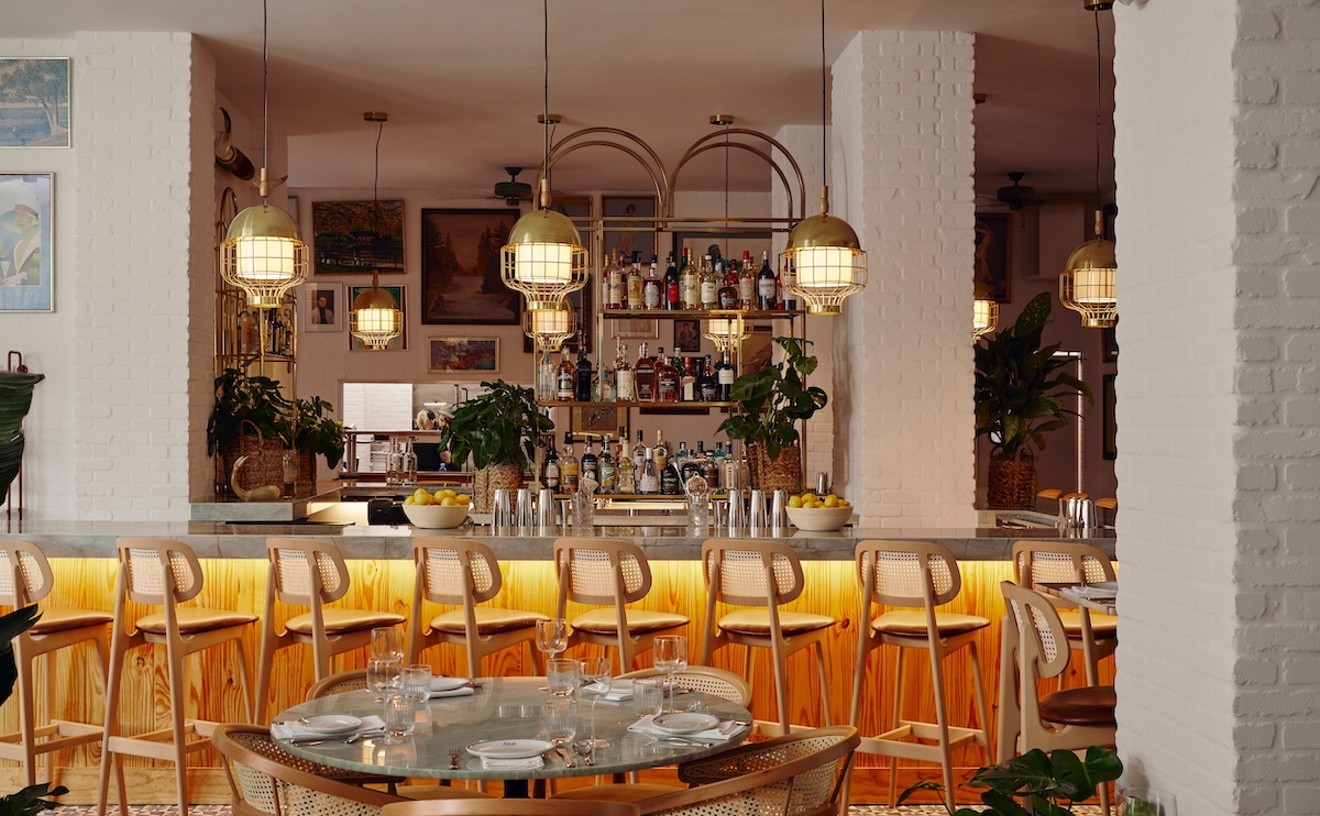It's just after 2 a.m. March 17 at J. Wakefield Brewing in Wynwood. Though the place has been closed for over an hour, five guys are seated in folding chairs just steps from the front bay door. They're huddled around a cooler filled with bottles of barrel-aged beers, fruit-tinged wild ales, and dessert-inspired stouts.
One of them, a fresh-faced 20-something in a black Union Beer Store T-shirt, pulls out a sleek bottle of Saison Premiere from Oregon's de Garde Brewing, a farmhouse ale aged in oak wine barrels. Glasses raise as he pours the group a few ounces of the funky-smelling, opaque yellow brew. Then they drink.
They're not alone. Though the brewery won't open for another eight hours, more than 100 others have congregated on the sidewalk in a line that snakes east along NW 24th Street. By 3 a.m., the crowd has swelled to more than 200, all of them prepared to spend the night drinking and mingling until the brewery begins sales of two of its most popular beers.
For the fourth time, J. Wakefield Brewing owner Johnathan Wakefield is releasing his DFPF, a neon-pink dragon fruit–passionfruit sour beer ranked the number one Berliner Weisse in the world by ratebeer.com. Priced at $20 per 25-ounce bottle, it sold alongside Big Poppa, a coconut-, coffee-, and vanilla-infused imperial stout he first bottled in 2016 that sells for $25 per 25-ounce bottle. The brewer made only 1,000 bottles of each. Customers in line were limited to two per person.
Waiting overnight to buy a beer you'll enjoy drinking might sound extreme, but not everyone is here for that reason. For some, the long wait is part of a plot to earn huge profits by illegally peddling their purchases.
"I'd say of all the first 50 to 100 guys in line, 75 percent of them are there with the intention to resell what they get," says Dave, a Miami resident who frequents most South Florida beer events and declines to give his name. "I'm in a lot of groups where [people resell beer], and I know plenty of people who make enough to live off it."
When the craft beer craze began more than 20 years ago, beer prices soared, and small breweries cropped up across America. In the past decade, black-market reselling of beers has also grown quickly, resulting in ungodly prices. Today, a bottle that retails for $20 to $30 can sell for 150 times that amount.
The beer retailed for $20 per bottle. The very next day, it was listed online for $120.
tweet this
Though peddling alcohol on the web is technically illegal — eBay banned collectible beer sales in 2012 — websites such as mybeercollectibles.com advertise unique bottles for 50 times the purchase price. On a recent day, the site listed a 750-milliliter bottle of 2017 3 Floyds ChemTrailMix for $500 and Angry Chair Brewing's 2018 barrel-aged Imperial German Chocolate Cupcake Stout for $450. In the past, vintage beers have fetched more: A 12-ounce bottle of Hair of the Dog Brewing's Dave sold for $2,300. Cantillon's 2008 grape lambic, Don Quijote, of which only a handful of unopened bottles remain, went for $5,000.
It's legal to exchange rare bottles, but that's often neither practical nor sufficiently profitable. "These days, most people aren't going to trade a bottle when they can get big money for it," says Ben, a Broward County resident who also declines to give his name. He resells Wakefield's bottles so he can afford other rare beer. "The problem is I drink very good beer. It's gotten to the point where I have to sell bottles in order to buy what I want. They're too expensive otherwise."
For the past seven years, people like Ben have been turning to the most connected online marketplace of all, Facebook, to offload beer. Here, closed and secret groups use virtual raffles — many with a $10 to $20 buy-in — to resell suds for quick profit. Some groups have thousands of members who actively participate in weekly raffles, a practice referred to as razzling to bypass the social media site's scanning software used to report suspicious behavior.
Members of these groups post photos of the bottles and sell razzle "tickets" using online payment systems like PayPal or bank transfers. From there, the process works much like a normal raffle. "Razzling is basically gambling. Most groups base it off a lottery system like the [Illinois] Fireball or Mega Millions," Dave says. "The red ball — there are 25 for Mega Millions and ten for Fireball — determines the winner."
Such hidden groups exist with users nationwide, wherever coveted beer is being made. For beer lovers, it presents a more affordable way to obtain bottles or cans with exaggerated secondary price tags. It's also one of the few ways people from out of state can get their hands on Wakefield's most limited releases, whose bottles command some of the highest prices on the secondary market.
Wakefield went to high school in North Miami Beach and trained as an accountant. He began making beer in 2005, when his wife Natalie gave him a kit. Later he interned and then worked at Cigar City Brewing in Tampa, where for several years he experimented with various styles, including his now-famous Berliners, by adding fruits such as watermelon and blueberry.
In 2010, he created DFPF, what many consider the first Florida Weisse. The beer helped launch him to fame: In 2013, he raised $55,000 in just 30 hours on a crowdfunding website. He used those funds to open his Wynwood brewery in January 2015.
Wakefield recalls when the long lines for his beer releases began — in early 2016, for the first batch of Big Poppa, a beer brewed in collaboration with Moksa Brewing's Derek Gallanosa, Inu Island Ales' Jayson Pizarro, and Mostra Coffee's Mike Arquines. In 2017, his second Big Poppa drew midnight campers, people who showed up at his brewery the night before the release.
"When you start seeing people line up... and they start camping out overnight for your bottle releases, you know you've hit a new level of craziness," Wakefield says. "It's a shock when I come to work on a Saturday and there's already 300 people in line."
Last year, Wakefield began bottling two varieties of a beer he named Bake Kujira. It contains about 17 percent alcohol by volume and is aged in maple rum barrels for 12 months. There were 80 bottles of a variety with a metallic gunmetal-gray label, and only 20 of a purple label. They differed only slightly — one is a blend and one isn't. Today a purple label, among the most elusive on the secondary market, is valued at close to $3,500.
Prices rise quickly. Wakefield's Double Barrel La Nada, a blend of Russian imperial stouts aged in rum and bourbon barrels, was released last September for $30 per bottle. Only a few days later, it sold for $300.
The DFPF, which more than 200 people waited all night in line to buy this past March 17, retailed for $20 per bottle. The very next day, one was listed online for $120.
With that kind of profit involved, the secondary craft beer market will likely continue to thrive, making it the perfect outlet for opportunists to sell top-rated beers in short supply. "I'm not going to discourage it," Wakefield says. "Whether or not some guy makes money, it does drive demand through the roof, so I won't say it's a bad thing. I just don't want to see it get to a culture where that's the reason they're lining up. Let's try to keep [it to where] people aren't just seeing dollar signs.
J. Wakefield Brewing. 120 NW 24th St., Miami; 786-254-7779; jwakefieldbrewing.com.












